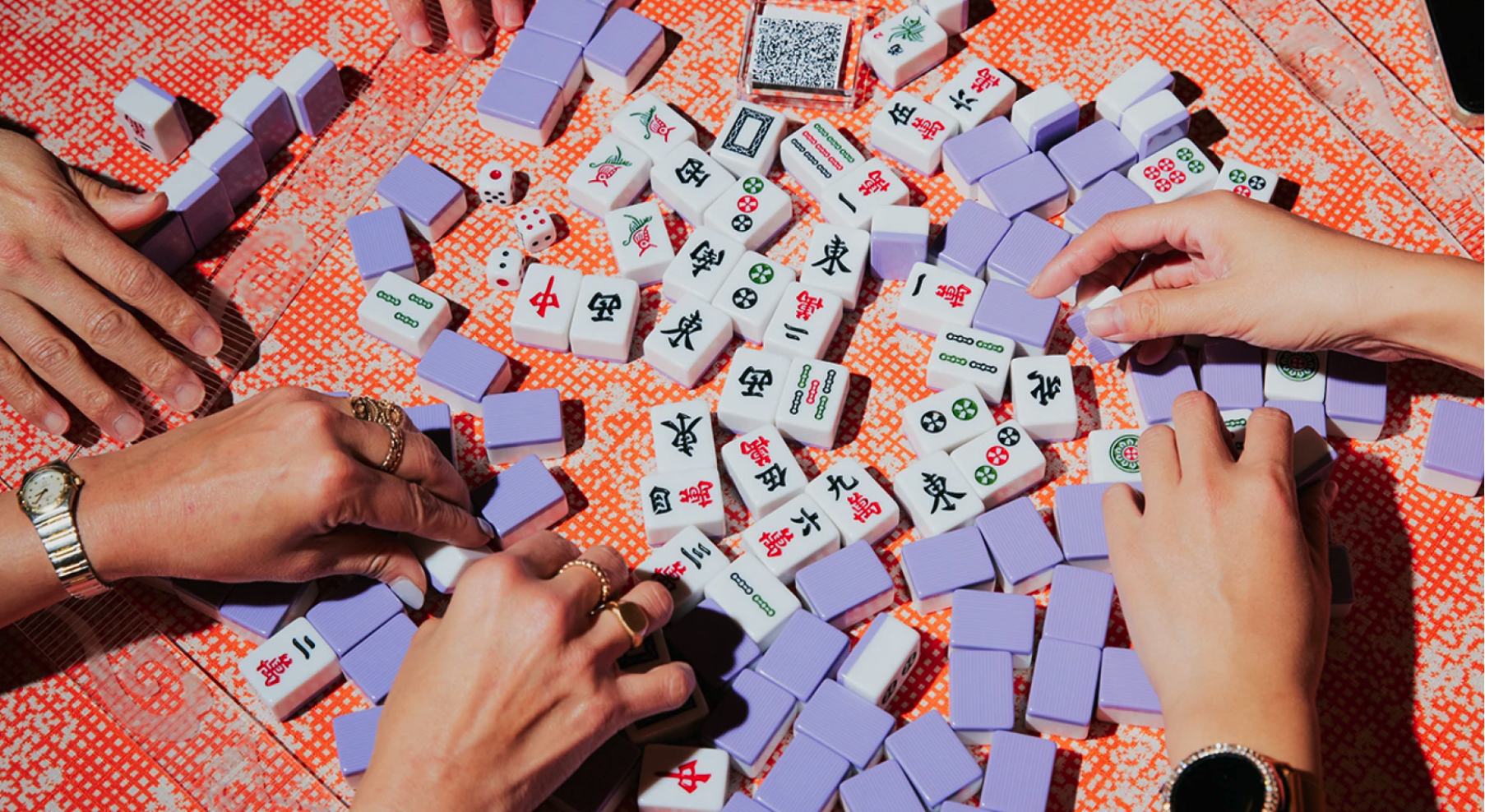*image Jennelle Fong
Imagine this: You’re sitting at a comfy kitchen table, tiles making a soft clicking noise, your friend complaining playfully as you take the last tile they needed. You laugh, and for a second, and forget about the shopping list in your head.
It’s not just a game – it’s like a hidden workout for your brain. Mahjong, that old game your grandma loved, isn’t just about winning. It’s like a secret brain gym, a way to relax from stress, and a way to become closer to friends, all at once. Let’s see how moving those tiles around can quietly change your health, one game at a time.
1. Your Brain on Mahjong: Think Faster, Smarter, Quicker
Ever notice how time flies when you’re strategizing over tiles? That’s your neurons doing cartwheels. Mahjong forces you to juggle a dozen thoughts at once, memorizing discarded tiles, predicting opponents’ next moves, and rearranging your own strategy like a puzzle.
Take Rita. At 72, she credits her “sharp as a tack” memory to weekly Mahjong nights. One evening, she casually recalled a tile from three rounds prior to blocking her friend’s winning move. Meanwhile, I’d forgotten where I parked at the mall earlier. The difference? Her brain’s been doing Mahjong push-ups for decades.
Why it works:
Pattern power: Spotting sequences in tiles trains your brain to notice details everywhere, including catching typos in emails or realizing your kid swapped the sugar with salt. Again.
Decision drills: That panic when you have 10 seconds to pick a tile? It’s practice for real-life quick choices, like merging lanes in traffic or nailing a job interview answer.
Long-game thinking: Planning three moves ahead in Mahjong? Same skills help you save for retirement or finally organize that junk drawer.
2. Memory Magic: Forget Keys, Never Forget Tiles
Let’s be real—we’ve all walked into rooms and blanked on why. Mahjong players? They’re over here remembering every tile discarded since 1997. The game’s built-in memory challenges are like a daily brain vitamin.
My neighbor Dave started playing online Mahjong during his lunch breaks. Two months in, he stopped needing Post-its for grocery lists. “It’s like my brain got decluttered,” he said. Science backs this: Studies show older adults who play Mahjong regularly have memory skills rivaling folks a decade younger.
Memory hacks hidden in the game:
Short-term boost: Tracking which flower tiles are out helps you remember where you left the TV remote. Probably.
Long-term armor: It’s not about preventing aging—it’s about staying sharp enough to argue with grandkids about TikTok trends.
Attention upgrade: Noticing a cracked tile trains you to spot expired milk dates or your partner’s new haircut. Eventually.
3. Friends, Laughter, and Less Loneliness
Here’s the thing nobody tells you: Mahjong isn’t really about the tiles. It’s about the eye-roll when Linda steals your winning piece again. The shared gasp when someone pulls off an impossible move. The way you end up discussing recipes and grandkids between rounds.
During lockdown, my sister’s Mahjong group moved to Zoom. What started as awkward silences turned into weekly therapy sessions with snacks. Tom, 68 and recently widowed, said it was his “reason to shower and smile on Tuesdays.” The tiles were just an excuse to connect.
Social superpowers of Mahjong:
Loneliness antidote: Regular games create micro-communities, whether it’s retirees at a community center or teens bonding over anime-themed digital Mahjong.
Stress buffer: Laughing over a botched strategy releases the same feel-good chemicals as a chocolate binge. Minus the guilt.
Confidence builder: Nailing a complex move? That “I’m brilliant!” high follows you into work meetings and first dates.
4. Stress? What Stress?
Adulting is exhausting. Bills. Traffic. That weird noise the fridge makes. But for 90 minutes of Mahjong, your biggest worry is whether to keep the red dragon tile. The game forces you into the present moment—no room for anxiety when you’re decoding tile patterns.
My college roommate used to play mobile Mahjong during subway commutes. “It’s cheaper than meditation apps,” she’d say. The repetitive sorting of tiles, the focus required—it’s like knitting for your brain. Calming, but with occasional bursts of “YES! FINALLY!”
Stress-melting secrets:
Flow state: Ever get so absorbed in a game you forget to check your phone? That’s your brain hitting the reset button.
Ritual comfort: Tuesday nights mean Mahjong, wine, and venting about Karen from accounting. Predictable joy in chaos.
Small wins: Completing a simple pair gives mini confidence boosts all game long. Take that, adult responsibilities!
5. Mindfulness Without the Yoga Mat
“Be present” sounds great until your to-do list starts tap-dancing in your head. Mahjong sneaks mindfulness into your life. Each move demands your full attention—no multitasking allowed.
I tried teaching my 14-year-old niece to play. At first, she kept glancing at her phone. By the third round? Fully immersed, analyzing tiles like a detective. “This is harder than math class,” she groaned, “but kinda… fun?”
Unexpected zen moments:
Distraction detox: Choosing tiles forces you to ignore texts, emails, and that pile of laundry judging you.
Emotional reset: Losing a round teaches you to shrug it off—a skill that helps when your flight gets canceled or the cake flops.
Tactile therapy: Physical tiles satisfy that fidgety urge. Digital versions? They’re like bubble wrap for your eyes.
Ready to Play Your Way to a Healthier You?
Here’s the truth: Nobody starts Mahjong thinking “This’ll lower my blood pressure.” But somewhere between learning the rules and trash-talking your cousin, magic happens. Your brain gets sneakily stronger. Your mood lifts. You remember why fun matters.
So grab some tea, call a friend, and let those tiles work their quiet magic. Worst case? You lose a few games. Best case? You gain a sharper mind, fuller heart, and maybe finally remember where you left the car keys.

